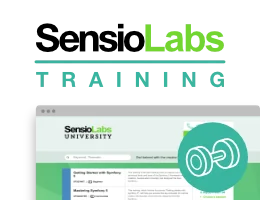How to Configure Monolog to Email Errors
3.6
Support for emailing errors using Symfony mailer was added in MonologBundle 3.6.
Monolog can be configured to send an email when an error occurs within an application. The configuration for this requires a few nested handlers in order to avoid receiving too many emails. This configuration looks complicated at first but each handler is fairly straightforward when it is broken down.
1 2 3 4 5 6 7 8 9 10 11 12 13 14 15 16 17 18 19 20 21 22 23 24
# config/packages/prod/monolog.yaml
monolog:
handlers:
main:
type: fingers_crossed
# 500 errors are logged at the critical level
action_level: critical
# to also log 400 level errors (but not 404's):
# action_level: error
# excluded_http_codes: [404]
handler: deduplicated
deduplicated:
type: deduplication
handler: symfony_mailer
symfony_mailer:
type: symfony_mailer
from_email: 'error@example.com'
to_email: 'error@example.com'
# or list of recipients
# to_email: ['dev1@example.com', 'dev2@example.com', ...]
subject: 'An Error Occurred! %%message%%'
level: debug
formatter: monolog.formatter.html
content_type: text/html1 2 3 4 5 6 7 8 9 10 11 12 13 14 15 16 17 18 19 20 21 22 23 24 25 26 27 28 29 30 31 32 33 34 35 36 37 38 39 40 41 42 43 44 45 46 47 48
<!-- config/packages/prod/monolog.xml -->
<?xml version="1.0" encoding="UTF-8" ?>
<container xmlns="http://symfony.com/schema/dic/services"
xmlns:xsi="http://www.w3.org/2001/XMLSchema-instance"
xmlns:monolog="http://symfony.com/schema/dic/monolog"
xsi:schemaLocation="http://symfony.com/schema/dic/services
https://symfony.com/schema/dic/services/services-1.0.xsd
http://symfony.com/schema/dic/monolog https://symfony.com/schema/dic/monolog/monolog-1.0.xsd">
<monolog:config>
<!--
500 errors are logged at the critical level,
to also log 400 level errors (but not 404's):
action-level="error"
And add this child inside this monolog:handler
<monolog:excluded-http-code code="404"/>
-->
<monolog:handler
name="main"
type="fingers_crossed"
action-level="critical"
handler="deduplicated"
/>
<monolog:handler
name="deduplicated"
type="deduplication"
handler="symfony_mailer"
/>
<monolog:handler
name="symfony_mailer"
type="symfony_mailer"
from-email="error@example.com"
subject="An Error Occurred! %%message%%"
level="debug"
formatter="monolog.formatter.html"
content-type="text/html">
<monolog:to-email>error@example.com</monolog:to-email>
<!-- or list of recipients -->
<!--
<monolog:to-email>dev1@example.com</monolog:to-email>
<monolog:to-email>dev2@example.com</monolog:to-email>
...
-->
</monolog:handler>
</monolog:config>
</container>1 2 3 4 5 6 7 8 9 10 11 12 13 14 15 16 17 18 19 20 21 22 23 24 25 26 27 28 29 30 31 32
// config/packages/prod/monolog.php
use Symfony\Config\MonologConfig;
return static function (MonologConfig $monolog): void {
$mainHandler = $monolog->handler('main')
->type('fingers_crossed')
// 500 errors are logged at the critical level
->actionLevel('critical')
// to also log 400 level errors:
// ->actionLevel('error')
->handler('deduplicated')
;
// add this to exclude 404 errors
// $mainHandler->excludedHttpCode()->code(404);
$monolog->handler('deduplicated')
->type('deduplication')
->handler('symfony_mailer');
$monolog->handler('symfony_mailer')
->type('symfony_mailer')
->fromEmail('error@example.com')
->toEmail(['error@example.com'])
// or a list of recipients
// ->toEmail(['dev1@example.com', 'dev2@example.com', ...])
->subject('An Error Occurred! %%message%%')
->level('debug')
->formatter('monolog.formatter.html')
->contentType('text/html')
;
};The main handler is a fingers_crossed handler which means that
it is only triggered when the action level, in this case critical is reached.
The critical level is only triggered for 5xx HTTP code errors. If this level
is reached once, the fingers_crossed handler will log all messages
regardless of their level. The handler setting means that the output
is then passed onto the deduplicated handler.
Tip
If you want both 400 level and 500 level errors to trigger an email,
set the action_level to error instead of critical. See the
code above for an example.
The deduplicated handler keeps all the messages for a request and then
passes them onto the nested handler in one go, but only if the records are
unique over a given period of time (60 seconds by default). Duplicated records are
discarded. Adding this handler reduces the amount of
notifications to a manageable level, specially in critical failure scenarios.
You can adjust the time period using the time option:
1 2 3 4 5 6 7 8 9
# config/packages/prod/monolog.yaml
monolog:
handlers:
# ...
deduplicated:
type: deduplication
# the time in seconds during which duplicate entries are discarded (default: 60)
time: 10
handler: symfony_mailer1 2 3 4 5 6 7
<!-- config/packages/prod/monolog.xml -->
<!-- time: the time in seconds during which duplicate entries are discarded (default: 60) -->
<monolog:handler name="deduplicated"
type="deduplication"
time="10"
handler="symfony_mailer"/>1 2 3 4 5 6 7 8 9 10 11 12 13
// config/packages/prod/monolog.php
use Symfony\Config\MonologConfig;
return static function (MonologConfig $monolog): void {
// ...
$monolog->handler('deduplicated')
->type('deduplicated')
// the time in seconds during which duplicate entries are discarded (default: 60)
->time(10)
->handler('symfony_mailer')
;
};The messages are then passed to the symfony_mailer handler. This is the handler that
actually deals with emailing you the error. The settings for this are
straightforward, the to and from addresses, the formatter, the content type
and the subject.
You can combine these handlers with other handlers so that the errors still get logged on the server as well as the emails being sent:
1 2 3 4 5 6 7 8 9 10 11 12 13 14 15 16 17 18 19 20 21 22 23 24 25
# config/packages/prod/monolog.yaml
monolog:
handlers:
main:
type: fingers_crossed
action_level: critical
handler: grouped
grouped:
type: group
members: [streamed, deduplicated]
streamed:
type: stream
path: '%kernel.logs_dir%/%kernel.environment%.log'
level: debug
deduplicated:
type: deduplication
handler: symfony_mailer
symfony_mailer:
type: symfony_mailer
from_email: 'error@example.com'
to_email: 'error@example.com'
subject: 'An Error Occurred! %%message%%'
level: debug
formatter: monolog.formatter.html
content_type: text/html1 2 3 4 5 6 7 8 9 10 11 12 13 14 15 16 17 18 19 20 21 22 23 24 25 26 27 28 29 30 31 32 33 34 35 36 37 38 39 40 41 42 43 44 45 46 47 48 49 50 51 52
<!-- config/packages/prod/monolog.xml -->
<container xmlns="http://symfony.com/schema/dic/services"
xmlns:xsi="http://www.w3.org/2001/XMLSchema-instance"
xmlns:monolog="http://symfony.com/schema/dic/monolog"
xsi:schemaLocation="http://symfony.com/schema/dic/services
https://symfony.com/schema/dic/services/services-1.0.xsd
http://symfony.com/schema/dic/monolog https://symfony.com/schema/dic/monolog/monolog-1.0.xsd">
<monolog:config>
<monolog:handler
name="main"
type="fingers_crossed"
action_level="critical"
handler="grouped"
/>
<monolog:handler
name="grouped"
type="group"
>
<member type="stream"/>
<member type="deduplicated"/>
</monolog:handler>
<monolog:handler
name="stream"
path="%kernel.logs_dir%/%kernel.environment%.log"
level="debug"
/>
<monolog:handler
name="deduplicated"
type="deduplication"
handler="symfony_mailer"
/>
<monolog:handler
name="symfony_mailer"
type="symfony_mailer"
from-email="error@example.com"
subject="An Error Occurred! %%message%%"
level="debug"
formatter="monolog.formatter.html"
content-type="text/html">
<monolog:to-email>error@example.com</monolog:to-email>
<!-- or list of recipients -->
<!--
<monolog:to-email>dev1@example.com</monolog:to-email>
<monolog:to-email>dev2@example.com</monolog:to-email>
...
-->
</monolog:handler>
</monolog:config>
</container>1 2 3 4 5 6 7 8 9 10 11 12 13 14 15 16 17 18 19 20 21 22 23 24 25 26 27 28 29 30 31 32 33 34 35 36 37 38 39
// config/packages/prod/monolog.php
use Symfony\Config\MonologConfig;
return static function (MonologConfig $monolog): void {
$monolog->handler('main')
->type('fingers_crossed')
->actionLevel('critical')
->handler('grouped')
;
$monolog->handler('grouped')
->type('group')
->members(['streamed', 'deduplicated'])
;
$monolog->handler('streamed')
->type('stream')
->path('%kernel.logs_dir%/%kernel.environment%.log')
->level('debug')
;
$monolog->handler('deduplicated')
->type('deduplicated')
->handler('symfony_mailer')
;
// still passed *all* logs, and still only logs error or higher
$monolog->handler('symfony_mailer')
->type('symfony_mailer')
->fromEmail('error@example.com')
->toEmail(['error@example.com'])
// or a list of recipients
// ->toEmail(['dev1@example.com', 'dev2@example.com', ...])
->subject('An Error Occurred! %%message%%')
->level('debug')
->formatter('monolog.formatter.html')
->contentType('text/html')
;
};This uses the grouped handler to send the messages to the two
group members, the deduplicated and the stream handlers. The messages will
now be both written to the log file and emailed.

